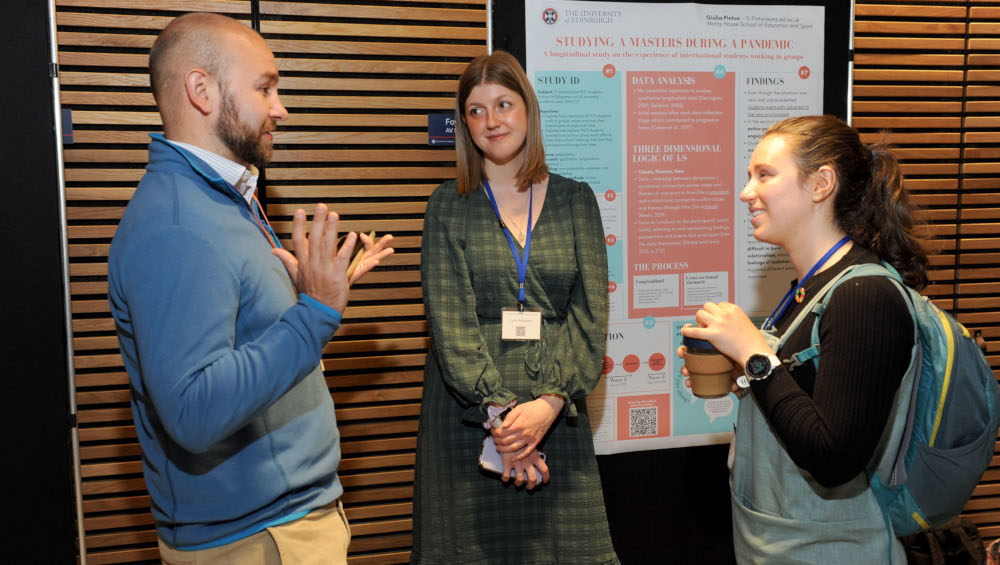
In this extra post, we share with you the Collegiate Commentary from the latest Teaching Matters newsletter: Five futures from the 5th Annual Learning & Teaching Conference. In the Collegiate Commentary feature, we ask colleagues from other universities and institutions to provide a commentary on ‘Five things…’, and share their own learning and teaching reflections, resources or outputs on the same topic. In this newsletter, we welcome a commentary from Dr Cameron Graham, a Lecturer at Edinburgh Napier University, Department of Learning & Teaching Enhancement.
As the summer of 2022 approached, academic conferences and gatherings were once again returning in-person. I took the opportunity to get back on the ‘conference circuit’, making up for time lost through Covid restrictions. My circuit was completed by attending the 5th Annual Learning and Teaching (L&T) Conference at The University of Edinburgh where many inspiring practice and forward-focussed thinking was shared in looking to how we, as academics and educators, learn from the Covid experience to shape the future. As such, I was delighted to be invited to provide my commentary on the Five Futures from the L&T Conference, ‘Shaping our Futures’, in this Newsletter.
Future 1: “The future of education is digital… Our digital tools may thus only be as good as the pedagogy that scaffolds them.” While useful for connecting and engaging learning online, I believe that the digital cannot replace the need for genuine human relation in learning that emerges in interactions, discussion and collaboration between students as peers, and students and their tutors. At Edinburgh Napier University (ENU), our PgCert Teaching & Supporting Learning in HE unites both of these aspects in our dialogic pedagogical approach. Meaningful interpersonal collaboration is encouraged and supported using technology that affords and facilitates these interactions and discussions in the online environment. Our innovative assessment design has exemplified the significance and efficacy of comparative assessment and feedback approaches led by students as peers (e.g., Nicol & McCallum, 2021). Embracing and experimenting with peer-led assessment and feedback, whether online or on-campus, arguably holds promise in light of the “competitive marking conventions”, which Itamar Kastner and Rebekka Puderbaugh rightly suggest, requires a ‘shake-up’. However, it is imperative that we do not allow technology to determine learning but to be driven and scaffolded with appropriate pedagogy supporting students and their intended learning.
This is one recommendation for online and blended learning informed from the ’10 Principles of Blended Learning’ at ENU. These principles were informed from our award-winning Digital Support Partnership project, led by my colleague, Dr Louise Drumm, which supported colleagues and students during the university-wide implementation of emergency online learning, teaching and assessment. Taking learning from that experience, we then consulted widely on what aspects of digital education approaches could be adopted longer-term. This resulted in the creation of ’10 Principles of Blended Learning’, which support colleagues in taking pedagogically-informed approaches to designing inclusive and accessible learning experiences for all students, whether on-campus or digitally mediated.
Future 2: The future of education is skilled: “[…] the skill of critical thinking remains imperative, particularly in the 21st century.” Kalsoom Jaffar and Andreas Schleicher argue for critical thinking skills in the 21st century to be considered as part of a “transferable skillset”. As a critical educator, I cannot contest this. However, I would argue that we expand the focus, scope, and forms of critical thinking that dominate UK higher education. Within our present neoliberal context, universities accentuate the development of students’ critical thinking development through a lens of transferable skills for employability. Instead, I believe that we should displace this narrow focus on critical thinking linked to an employability to a multi-dimensional concept of criticality.
My own research with international students, like Jaffar’s investigation with her finance students, explored their critical thinking-related challenges, and identified that the concept of ‘contexts of difference’ (Graham, 2022) provides the ideal conditions for criticality to develop. ‘Contexts of difference’ incorporates student diversity, differing perspectives, and dialogue to provide a space for these students to engage meaningfully with the critical practices of UK higher education. They are often unable to engage with these practices due to unspoken, tacit conventions of academia that often present barriers to their learning and engagement.
The linked “digital competencies agenda” is captured in one of the cross-cutting themes of our new ENhance Curriculum Framework at ENU – ‘Digital and Information Literacy’. Within our present context of media proliferation, there is a need for digital competencies to have a critical element to empower students to discern credible, reliable and accurate data/information from false or unreliable or misrepresented data. This need goes beyond
digital competency for employability and workplace skills. Rather, these critical digital competencies/abilities are required for individuals as they engage on a daily basis with news, social media and so on, in order to make informed, judgements and actions.
Future 3: The future of education is collaborative. For me, the L&T conference evidenced the value of collaboration and interdisciplinarity, capturing what Kreber (2008) argues for in the need for academics to go beyond disciplinary identities and boundaries to communicate and collaborate with “colleagues from a wide range of other disciplinary cultures”. As Kreber contends, it is at this intersect that as educators, “we encounter ways of thinking and about teaching and assessment radically different from our own” (p. 29). These encounters stimulate critical reflection of our own practice informed by cross-disciplinary exchange – something the conference demonstrated and provided for me through chatting to geographers, biologists and philosophers about their students and their teaching practice.
At ENU, we strive for cross-disciplinary collaboration and dialogue institutionally, and it is embedded within our PgCert TSL. Harnessing our learning from the pandemic, we took the most promising aspects of these identified through pilot activities (e.g. Focus On Fellowship: a week long intensive, supported online programme for developing and submitting Fellowship claims) to implement a new, supportive pedagogical approach to build community. This approach aims to support learning amongst peers, the sharing of diverse experiences and approaches to teaching and professional development, and instils collaborative working across disciplines. Our PgCert utilises online, multi-disciplinary peer groups of colleagues across the programme where they discuss and work collaboratively in asynchronous Teams channels, as well as working in live, online breakout spaces, in online workshops, and in groups on assessments. Feedback on this approach has been overwhelmingly powerfully positive from all parties – student participants, tutors and our external examiner.
Future 4: The future of education needs to create a home for students
“We want a campus life that embraces the notion of caring about others; that it is warm, with a humanising pedagogy and full of [Paulo] Freire’s pedagogy of hope and love.”
Now, more than any time in my own memory, has the notion of warmth, home and hope meant so much during this unsettling period time of financial, economic crises, and inequality. This also has significant implications on universities to support to our students, their families, and staff but also in their traditional remit of public, social institutions. There is need to provide warm and welcoming spaces in our universities for students but also for our local community who are often seen as excluded from these public buildings, which their taxes partly pay for and power, in order to provide warmth and a space for conversation, sharing, and maybe even hope in the future.
At ENU, we are considering our university campuses, and the learning spaces within these, as part of our strategic infrastructure project, VISION. As a large, widening access institution, informed by our ENhance Curriculum Framework and Principles of Blended Learning, we are aiming to provide inclusive, welcoming spaces on our campuses that encourage interaction and collaboration between students, and promote active learning. Within this context of widening inequality and economic inflation that is plunging many into relative poverty, now, if ever, is the time for the university of the common weal (good), as Neil Speirs’ work exemplifies.
Future 5: The future of education is already here. Indeed. The education of the future is before us. It is within the simple yet powerful interactions and relations that we have with students, between students and with one another inside (and outside) of the classroom where the ‘togetherness’ which Prof. Cathy Bovill speaks of in her work on student co-creation is realised and promoted (Bovill, 2020).
We embrace student partnership and co-creation at ENU, and this is seen within our CATE award-winning (Collaborative Award for Teaching Excellence) student-led peer review of teaching programme, Students as Colleagues, partly developed by IAD’s Dr Jenny Scoles (Huxham et al., 2017). This innovative review of teaching practice sees volunteering students train as professional peer reviewers of teaching demonstrating student partnership in programmes and teaching development.
In my own department, the Department of Learning & Teaching Enhancement, we recruit student interns as project partners and co-researchers. We have created a new internal Head of Student Engagement post to lead strategic enhancement activities across the university that centre on furthering student co-creation of projects, programmes, curricula, learning spaces, and the university itself to an extent. This is seen in the co-creation of a new student partnership agreement with our Students’ Association (ENSA), and illustrates the proclamation Prof. Cathy Bovill advances, that “universities are always ‘better’ when they work together with students” is embraced at ENU.
From the trivium and quadrivium to Humboldt and the 21st Century university, the university as an institution is arguably at a turning point with the future role and purpose of higher education, and whom it is for, in flux amidst political, economic and societal tensions, making the closing provocation from this ‘Five Things…’ edition very apt: What even is a University, anyway?
 Cameron Graham
Cameron Graham
Cameron Graham is a Lecturer at Edinburgh Napier University, Department of Learning & Teaching Enhancement, where he leads the University’s PgCert for early career academics and Fellowship Scheme – ENroute. Cameron previously supported international students’ learning. This inspired his doctoral research exploring international master’s students’ experiences at three UK universities focusing on their conceptualisation, development and application of criticality and adaption to their new contexts of learning. Results from this research provide insights to facilitate international students’ successful transitions into and inclusive engagement with the critical practices of UK HE. Intercultural learning characterised by “contexts of difference” was a key finding and recommendation for practice which he incorporates within his own programme and teaching.

